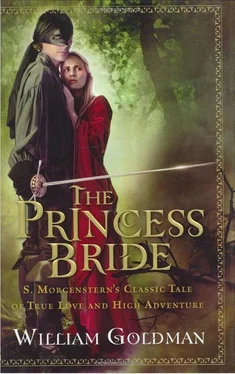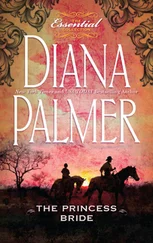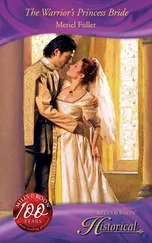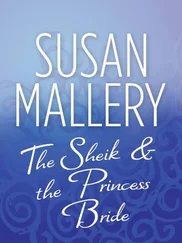And, I'm sorry, you don't knock off someone like that. It's wrong. Just to get your story off with a bang.
In other words, I disapprove of this opening. There are, in fact, a number of things I'm not happy with in this chapter. But you know the reasons I have to go along.
And I'm also not sure I should be including this next section about Inigo. I had a big fight with my publisher, Peter Gethers. He's against putting it in, finds it confusing. Before I give my reasons, I think you better have a chance to see for yourself what we're arguing about.
2. Inigo
INIGO WAS IN Despair.
Hard to find on the map (this was after maps) not because cartographers didn't know of its existence, but because when they visited to measure its precise dimensions, they became so depressed they began to drink and question everything, most notably why would anyone want to be something as stupid as a cartographer? It required constant travel, no one ever knew your name, and, most of all, since wars were always changing boundaries, why bother? There grew up, then, a gentleman's agreement among mapmakers of the period to keep the place as secret as possible, lest tourists flock there and die. (Should you insist on paying a visit, it's closer to the Baltic states than most places.)
Everything about Despair was depressing. Nothing grew in the ground and what fell from the skies did not provoke much happy conversation. The entire country was damp and dank, and why the locals all did not flee was not only a good question, it was the only question. Locals talked about nothing else. "Why don't we move?" husbands would say each day to wives, and wives would answer, "God, I don't know, let's," and children would jump and shout, "Hooray hooray, we're out of here," but then nothing would happen. Bindibus live in more hideous conditions but they don't travel a lot either. There was a certain comfort in knowing that no matter how bad things were, they couldn't get worse. "We have endured everything," the locals would tell themselves. "Whereas if we pick up and go, say, to Paris, we would get gout and be insulted by Parisians all day."
Inigo, however, had a warm spot for the place. For it was here, years and years ago, that he had won his first fencing championship. He had arrived shortly before the tournament was to begin, and he had come with a heavy heart. Tears always behind his eyes. He could not shake his mood, because of what had just happened to him in Italy, on his first visit there. A journey he had begun with such hopes....
BY THE TIME he turned twenty, Inigo Montoya of Arabella, Spain, had spent his last eight years wandering the world. He had not yet begun the hunt for the six-fingered man who had killed his beloved father, Domingo. He was not ready and would not be until the great swordmaker, Yeste, pronounced him so. Yeste, his father's dearest friend, would never send him out if there were flaws. Flaws would not only bring death but, far worse, humiliation.
Inigo knew one thing and that only: when he finally found his tormenter, when he was at last able to face him and say, "Hello, my name is Inigo Montoya, you killed my father, prepare to die," there could be no question in his mind of defeat. The six-fingered man was a master. And so, preparing for such a master, Inigo had wandered the world. Getting stronger as he grew, learning from whoever could teach him mysteries that needed solving. Lately, he had begun to specialize. His talents were past phenomenal, but still not good enough to get the blessing of Yeste.
He had recently been to Iceland, to spend months with Ardnock, the great frozen terrain expert. Inigo had already mastered fighting from below and from above, fighting from trees, from rocks, in rapids. But what if the six-fingered man was from the far north, and they battled on frost, or freshly watered ice? And what if Inigo, helpless and slipping, lost his balance, lost the battle, lost everything?
After Iceland, he spent half a year on the equator, studying with Atumba, the master of heat, because what if the six-fingered man came from a steaming country, and what if they battled in the heat of the hottest day, temperature at 150, and what if the grip of his sword went wet for a moment in his hand?
Now, having just turned twenty, he was in Italy, to see Piccoli, the tiny ancient, the acknowledged king of the mind. (Piccoli was from the most famous line of great Italian teachers—another branch was centered in Venice and taught singing to every famous Italian tenor whose name ends in a vowel.) Inigo knew he would not be able to think when his death battle came. His mind had to be a spring day, and his movements had to come on their own, his spins and twists and thrusts all had to leap unbidden.
Piccoli lived in a small stone house, in the employ of Count Cardinale, the strange and secret man who controlled most of the country. Piccoli had heard of Inigo because although Yeste was the greatest and most famous maker of swords, there were rumors that when he was confronted with a task that was too much even for him, he would go to the town of Arabella, high in the hills above Toledo, to the hovel of one Domingo Montoya, a widower who lived with a young son.
It was there that the six-fingered sword had been forged.
Could it truly be the wonder of his world? Piccoli had heard of it for a decade, yearned to see it dance before he died. The greatest weapon since Excalibur and where was it now? Gone with the child Montoya from the house of Yeste. And where was that child?
Piccoli had spent his entire long life training his mind, so that he had the ability to sit for a day in the middle of a mad battle and know nothing of the screams and slaughter going on around him. When he was in his mind, he was as if dead. And every morning at dawn he would go into his mind and stay there 'til noon. No power could disturb him.
He had gone into his mind at dawn, one day, there to stay 'til the sun was highest—but on this one morning, at eight o'clock, a strangeness.
He was in his mind as he always was at six and at seven and at half-past seven, and at quarter 'til eight, and ten 'til, and five and four and three—
—and then Piccoli was pierced by something so dazzling even he had to open his eyes—
—to see a young man approaching, tall, blade-thin, muscular, spring-legged, who was handsome enough but would have been more than that, save for the two scars that paralleled his cheeks—
—who held such glory in his hands, the sun was dancing there.
Piccoli could not breathe as the young man approached. "I want to see Mr. Piccoli, please."
"I wish to see your sword."
Piccoli trembled as he took it in his tiny hands. "What could you possibly want from me?" He could not take his eyes off the weapon. "You have the world here."
Inigo told him.
"You want me to teach you to control your mind?" Piccoli asked.
Inigo nodded. "I have come from very far."
"A waste, I fear. You are young. The young have not the patience. They are stupid. They think their bodies will save them."
"Let me learn."
"Pointless. Go wage your battle without me."
"I beg you."
Piccoli sighed. "All right. Let me show you how stupid you are. Answer my queries: what on all the earth do you want more than anything?"
"Why, to kill the six-fingered man, of course."
And with that Piccoli started screaming: "Wrong, wrong! Listen— see what I say." His voice grew soft, seductive. "The six-fingered man has his sword in his hand—he thrusts—see what I say, Montoya, watch the sword. He has thrust the sword toward your father, now the sword is entering your father's heart, Domingo's heart is shredded and you are ten and standing there, you are helpless, do you remember that moment? I command you, remember that moment! "
Читать дальше












